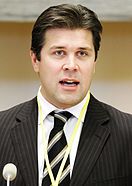User:Atlantica/Sandbox2: Difference between revisions
No edit summary |
m (1 revision imported) |
(No difference)
| |
Revision as of 03:39, 27 March 2019
Putting this here for later use when I work on the new Atlantican election articles::
| |||||||||||||||||||||||||||||||||||||||||||||||||||||||||||||||||||||||||||||||||||||||||
All 100 seats in the Althing 51 seats needed for a majority | |||||||||||||||||||||||||||||||||||||||||||||||||||||||||||||||||||||||||||||||||||||||||
|---|---|---|---|---|---|---|---|---|---|---|---|---|---|---|---|---|---|---|---|---|---|---|---|---|---|---|---|---|---|---|---|---|---|---|---|---|---|---|---|---|---|---|---|---|---|---|---|---|---|---|---|---|---|---|---|---|---|---|---|---|---|---|---|---|---|---|---|---|---|---|---|---|---|---|---|---|---|---|---|---|---|---|---|---|---|---|---|---|---|
| |||||||||||||||||||||||||||||||||||||||||||||||||||||||||||||||||||||||||||||||||||||||||
| |||||||||||||||||||||||||||||||||||||||||||||||||||||||||||||||||||||||||||||||||||||||||
Atlantica held the 2013 general election on January 1st, 2013, in which all 100 members of the Althing were elected using Direct proportional representation. It saw the end of the centre-right government of Johanna Gunnarsdóttir and Einar Einarsson and the election of the centre-left government of Matteus Gunnlaugsson and Bjarni Árnason. All member parties of the informal left-wing bloc increased their share votes, while all member parties of the informal right-wing bloc decreased their share of votes, although the Democratic Party's share of seats remained stable.
The election was the Communist Party's best result since the fall of Marxist-Leninist regimes across Esquarium, along with 1994. This has mostly been attributed to Bjarni Árnason's charisma, as well as the Communist Party's very public expulsion of the "Pseudo-Communist Fascists" (Marxist-Leninists, bar Titoists). Marxist-Leninists were a very small minority in the Communist Party, so the decision did not reduce its number of MPs.
The Greens also increased their share of votes and seats to their best ever (along with their result in 1998), primarily due to their end of opposition to nuclear power. Nuclear power supplies around 30% of Atlantican power and no meltdowns have occurred in Atlantica, and as such over 85% of Atlanticans are against lessening fission's role in creating Atlantican energy.
The Socialists were surprised by a stunning upset, as their widely-unpopular response to the 2009 economic recession led to a massive decrease in their votes in 2010, and they were expected by many to become the second largest party for the first time in nearly a century. However, the "Three-Point Program" of a minimum wage, 30 hour workweek, and closed shop for the public sector led to them to receive a modest increase in their share of the votes.
The increase of the RGSA's share of votes allowed the leftist, or non-bourgeois (socialist) parties to form a government under Matteus Gunnlaugsson.
Background
The right-wing government under <> was elected in 2010 following the 2009 economic recession, and promised to end the economic recession and reduce unemployment. However, the Atlantican economy did not leave recession until 2013, and unemployment rose from 5,1% to 8,9% during her tenure.
For those reasons, 2013 election was widely seen as a sign of disapproval of Johanna Gunnarsdóttir's government, as she was voted out of power and replaced by the government of former Allsherjargoði of the Althing Matteus Gunnlaugsson and Communist Party Leader Bjarni Árnason. This was mostly due to the increase of votes for the Greens and Communists, though all three left-wing parties increased their votes and seats.
Campaign
The election campaign, as mandated by Atlantican law, lasted 21 Days, from 30 November to the beginning of the Winer Solstice on 21 December. Due to Atlantica's strict Campaign Finance Law, all six parties in Parliament received ∑2 million Krónur in public financing ($5 million USD), while minor parties (registered political parties not in the Althing) received ∑100,000 Krónur ($250,000 USD). Private donations to politicians or political parties are illegal, and as such public financing was the only method of financing used in the election.
The left-wing parties, particularly the SFL, campaigned on the "Thee-Point Program" of a minimum wage, 30 hour workweek, and closed shop for the public sector, while the right-wing parties campaigned on a platform of tax cuts and liberalizing the Atlantican economy. As always in Atlantica, the vast majority of campaigning was heavily spirited door-to-door campaigning, parades and demonstrations led by political parties and unions.





